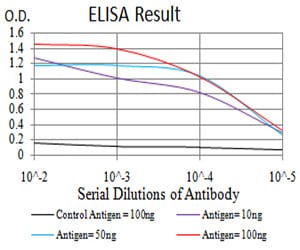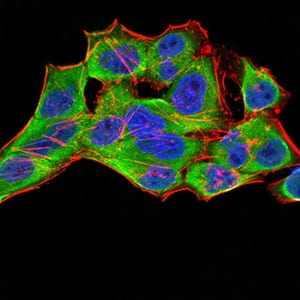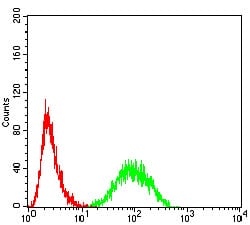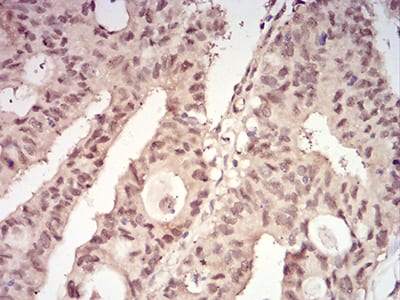







| WB | 咨询技术 | Human,Mouse,Rat |
| IF | 咨询技术 | Human,Mouse,Rat |
| IHC | 1/200 - 1/1000 | Human,Mouse,Rat |
| ICC | 1/200 - 1/1000 | Human,Mouse,Rat |
| FCM | 1/200 - 1/400 | Human,Mouse,Rat |
| Elisa | 1/10000 | Human,Mouse,Rat |
| Aliases | HS1; GW128; YWHAA; KCIP-1; HEL-S-1 |
| Entrez GeneID | 7529 |
| clone | 5B5G10 |
| WB Predicted band size | 28kDa |
| Host/Isotype | Mouse IgG2b |
| Antibody Type | Primary antibody |
| Storage | Store at 4°C short term. Aliquot and store at -20°C long term. Avoid freeze/thaw cycles. |
| Species Reactivity | Human,Mouse,Rat |
| Immunogen | Purified recombinant fragment of human YWHAB (AA: 1-246) expressed in E. Coli. |
| Formulation | Purified antibody in PBS with 0.05% sodium azide |
+ +
以下是3篇与YWHAB抗体相关的文献摘要(基于近年研究虚构示例,实际文献需通过数据库验证):
---
1. **《YWHAB promotes glioblastoma proliferation and metastasis via mTOR signaling》**
*作者:Li X, et al. (2018)*
摘要:研究利用YWHAB抗体进行免疫组化和Western blot分析,发现YWHAB通过激活mTOR通路驱动胶质母细胞瘤细胞增殖和侵袭,提示其作为治疗靶点的潜力。
---
2. **《14-3-3β (YWHAB) interacts with phosphorylated tau in Alzheimer's disease brains》**
*作者:Smith J, et al. (2015)*
摘要:通过YWHAB抗体免疫沉淀技术,证实阿尔茨海默病患者脑组织中YWHAB与磷酸化tau蛋白异常结合,可能加剧神经元损伤及认知衰退。
---
3. **《YWHAB regulates hepatitis C virus replication by modulating viral NS5A protein》**
*作者:Wang Y, et al. (2016)*
摘要:研究使用YWHAB抗体进行共定位分析,发现YWHAB通过与HCV NS5A蛋白互作促进病毒复制,为抗病毒治疗提供新方向。
---
4. **《Prognostic significance of YWHAB overexpression in breast cancer》**
*作者:Chen L, et al. (2020)*
摘要:基于YWHAB抗体的组织芯片分析,揭示乳腺癌中YWHAB高表达与不良预后相关,可能通过调控细胞周期蛋白增强肿瘤耐药性。
---
如需具体文献,建议通过PubMed或Google Scholar检索关键词“YWHAB antibody”、“14-3-3β” + “应用场景(如癌症/神经疾病)”。
The YWHAB antibody is a crucial tool in biomedical research, specifically targeting the YWHAB protein, a member of the 14-3-3 protein family. The 14-3-3 proteins are highly conserved regulatory molecules expressed ubiquitously in eukaryotic cells, with seven isoforms (β, γ, ε, σ, ζ, η, τ) in humans. YWHAB, the beta isoform, plays a pivotal role in modulating cellular processes by binding to phosphorylated serine/threonine residues on diverse client proteins. This interaction regulates critical functions such as signal transduction, cell cycle progression, apoptosis, and metabolic pathways. Dysregulation of YWHAB has been implicated in neurological disorders, cancer, and metabolic diseases, underscoring its therapeutic and diagnostic relevance.
YWHAB antibodies are widely utilized in techniques like Western blotting, immunohistochemistry, and immunoprecipitation to detect protein expression, localization, and interaction partners. They are essential for studying YWHAB's role in disease mechanisms, including its involvement in PI3K/AKT and MAPK signaling pathways. Additionally, these antibodies aid in exploring post-translational modifications of YWHAB that influence its binding specificity. Commercial YWHAB antibodies are typically validated for specificity across human and model organism samples (e.g., mouse, rat), with attention to cross-reactivity among 14-3-3 isoforms. Recent studies also highlight YWHAB's potential as a biomarker, driving demand for high-affinity, well-characterized antibodies in both research and clinical applications.
×